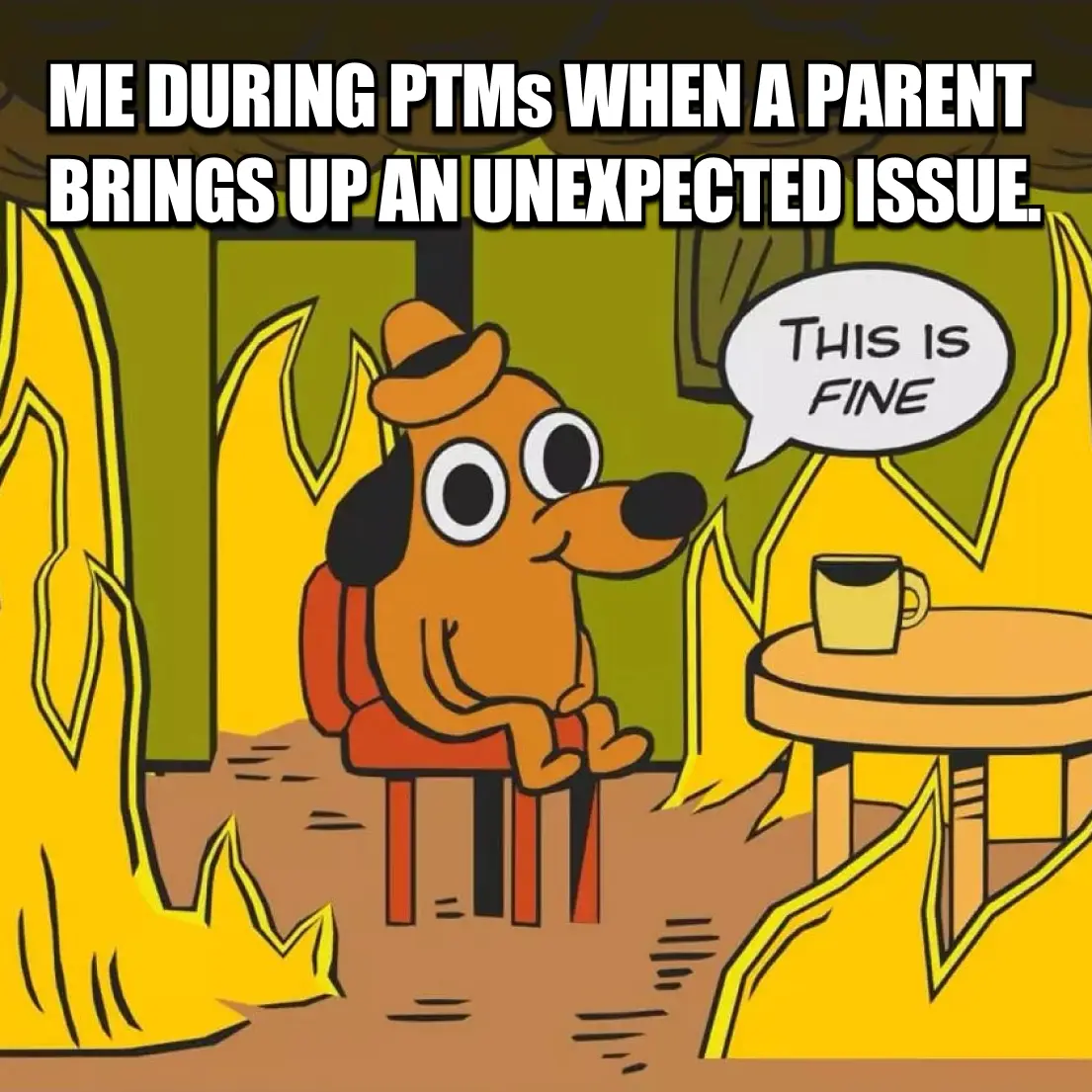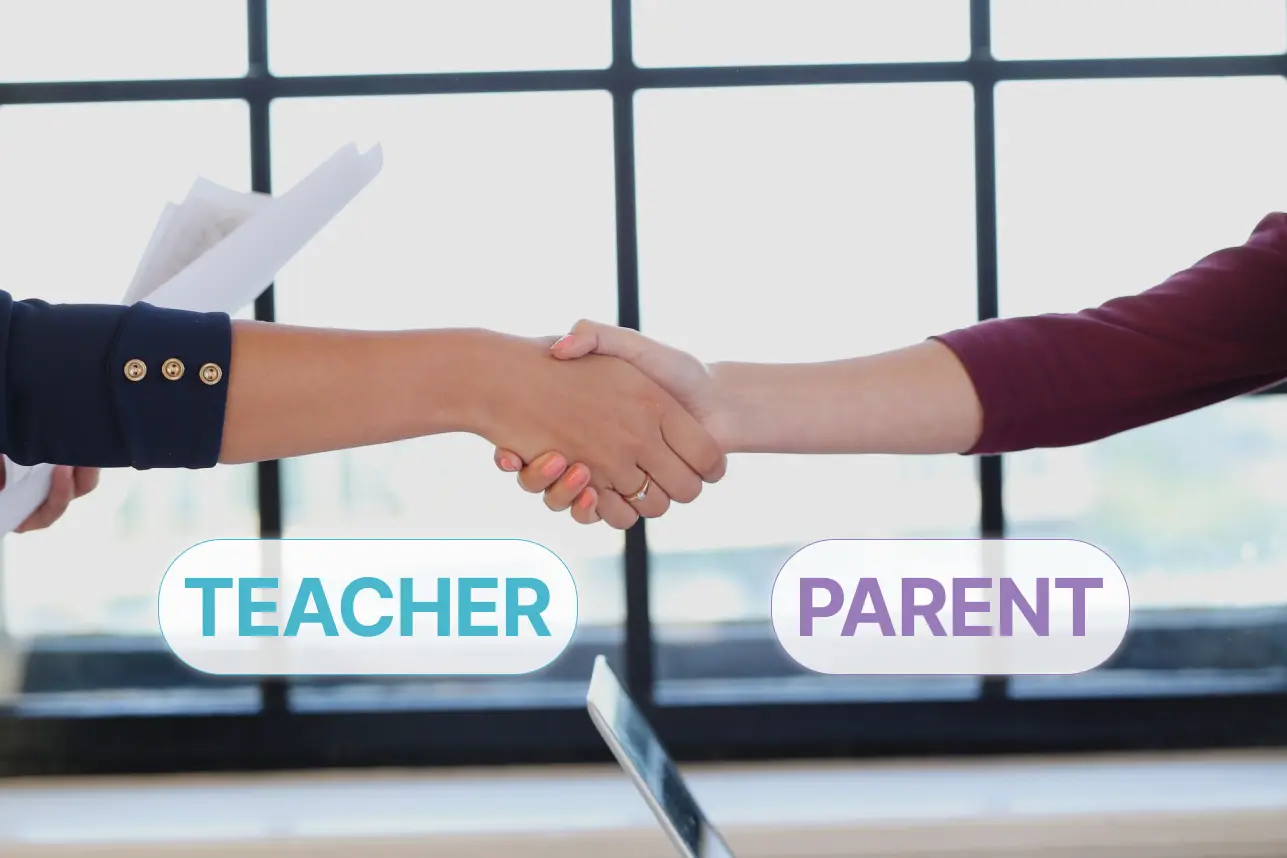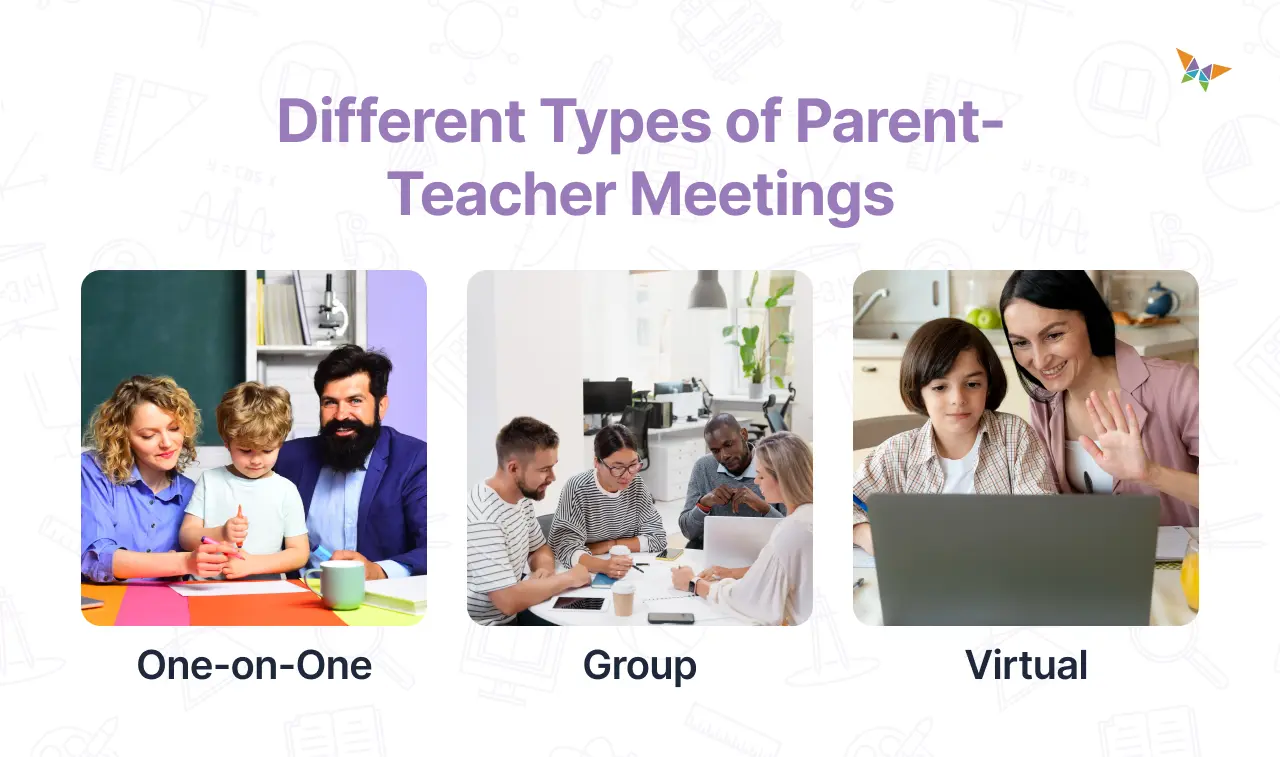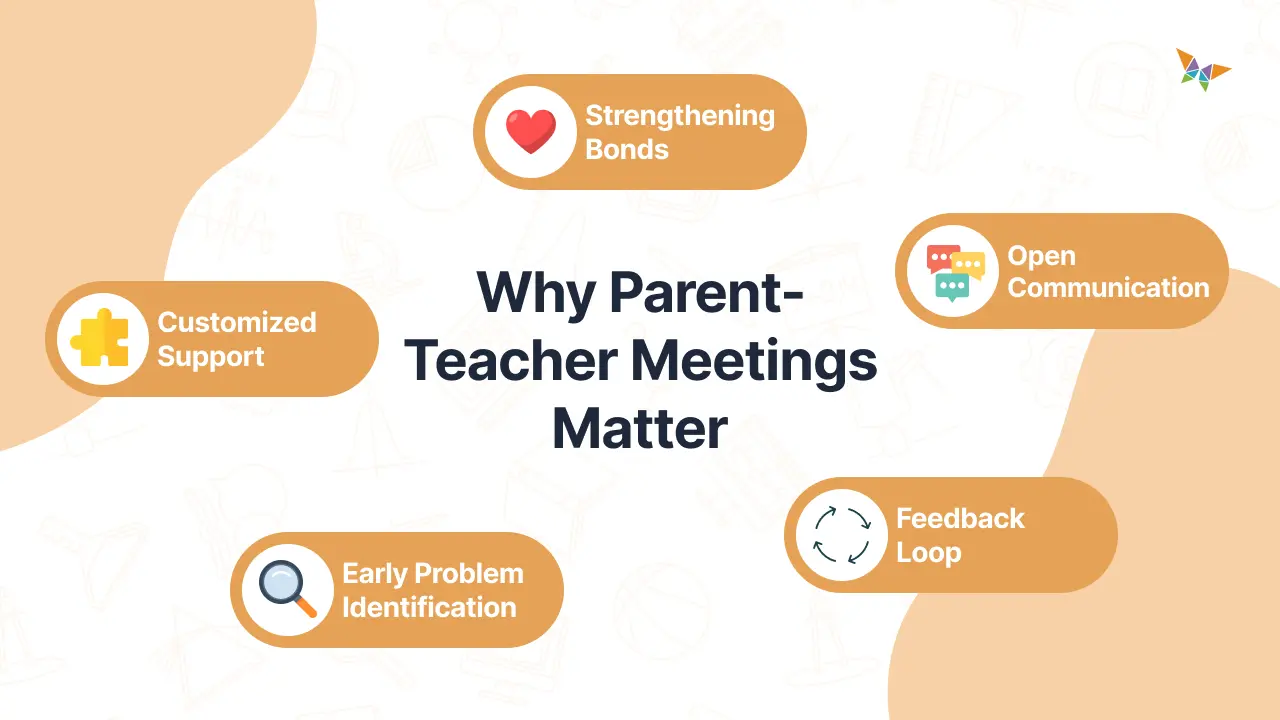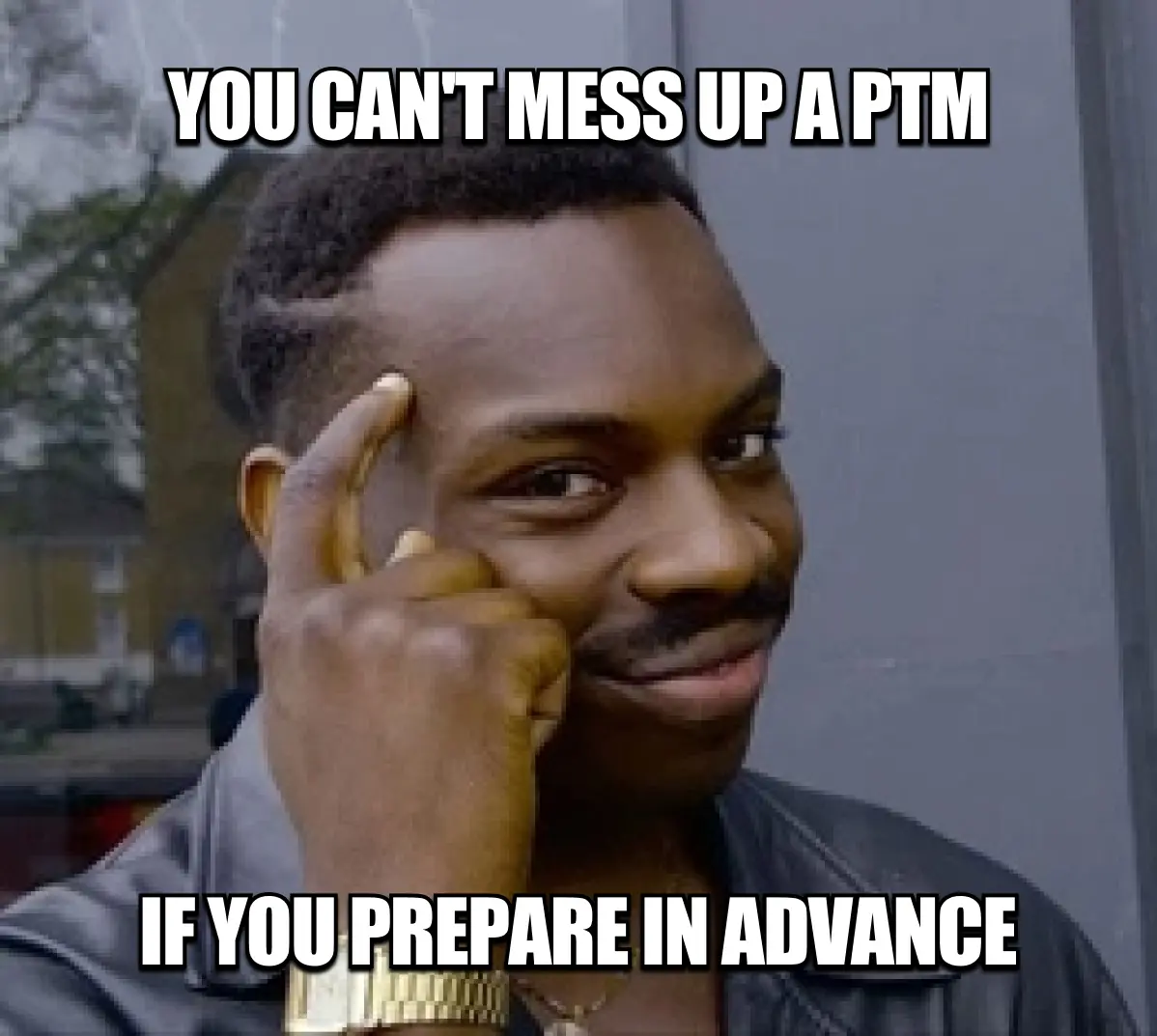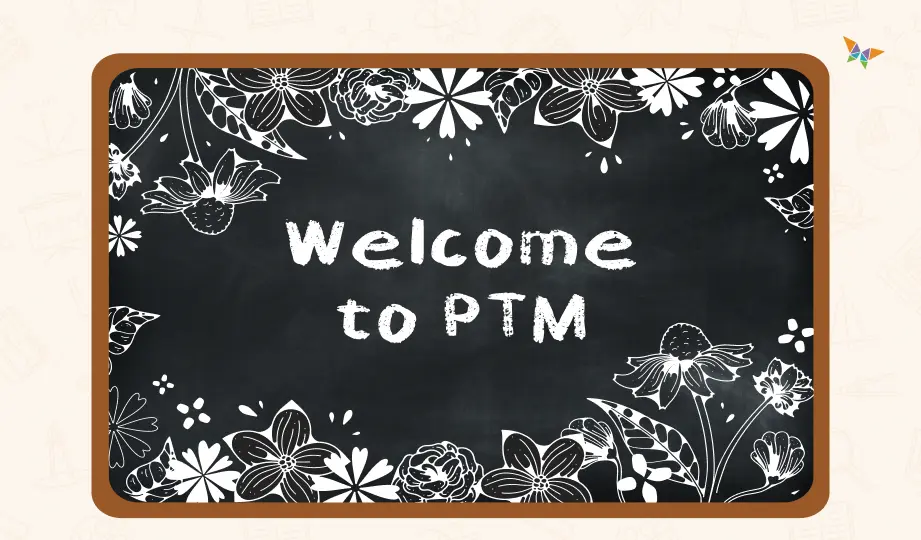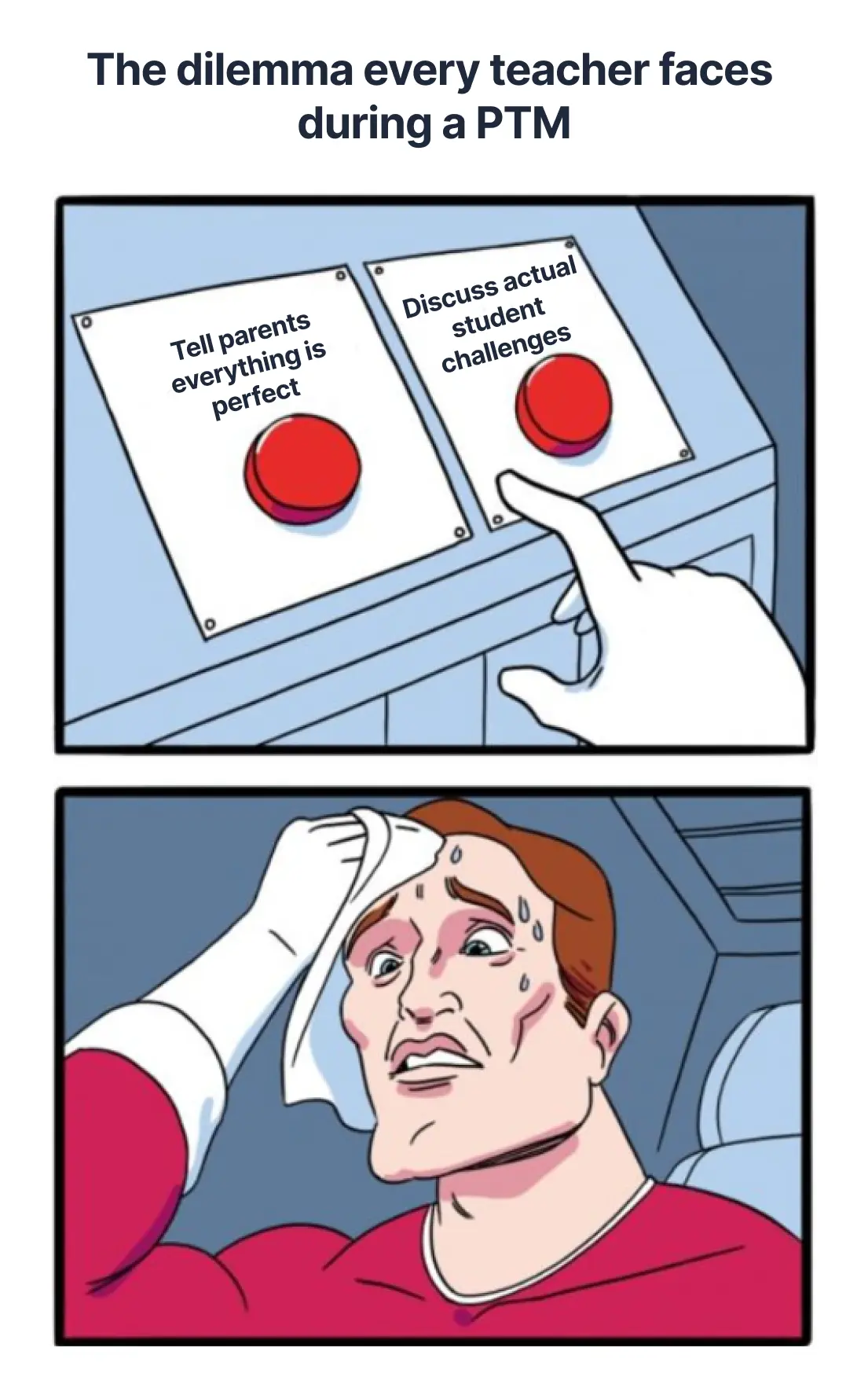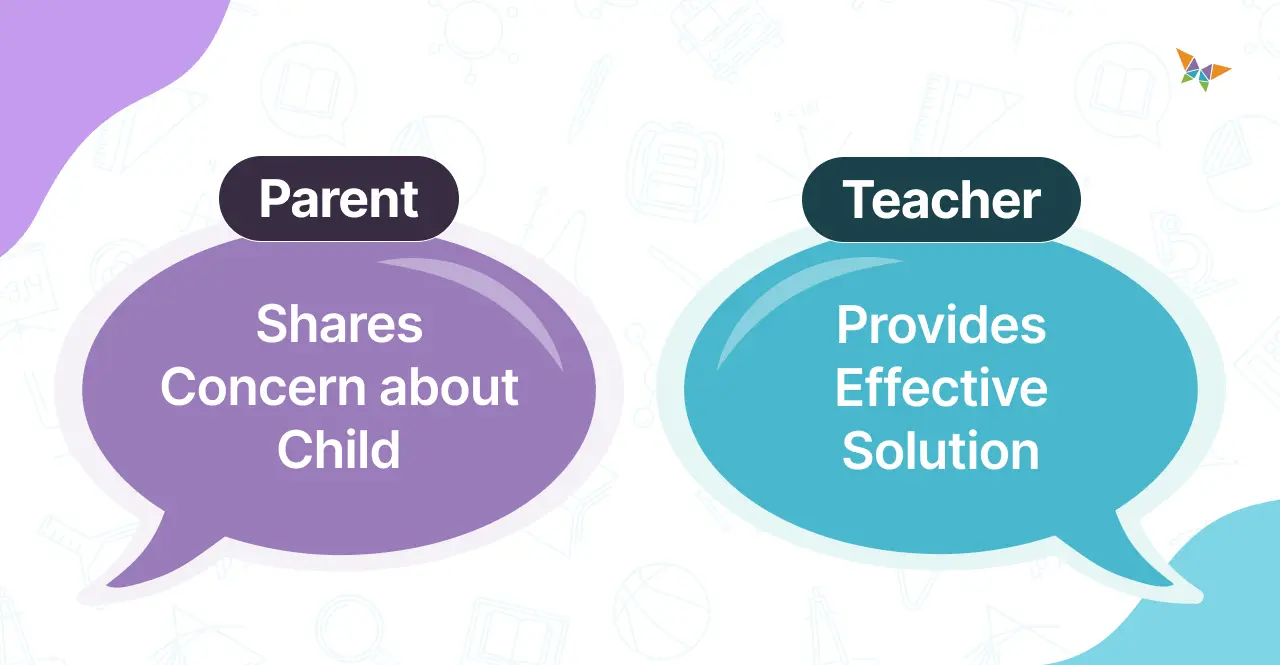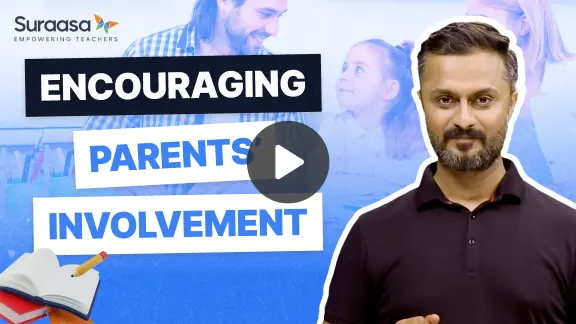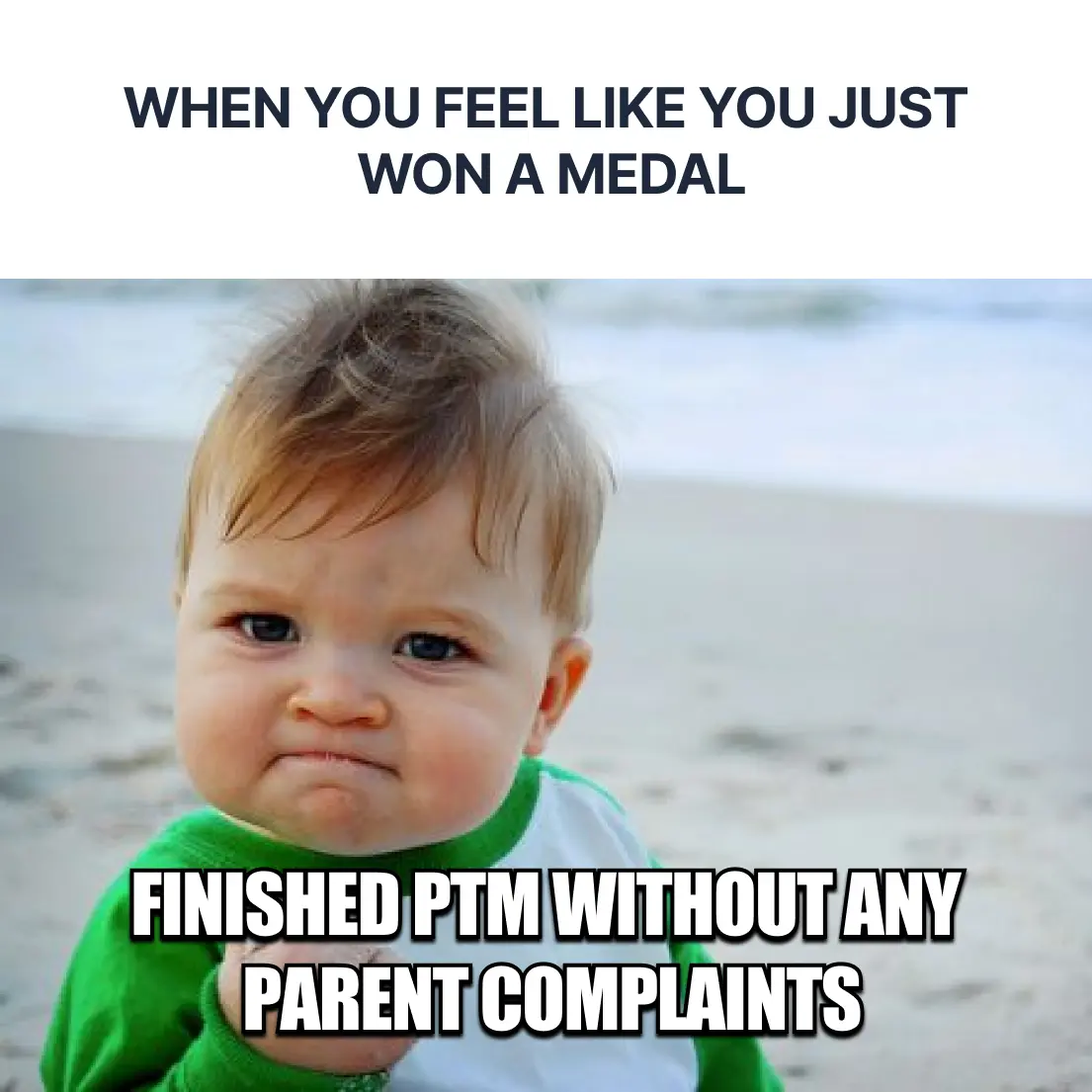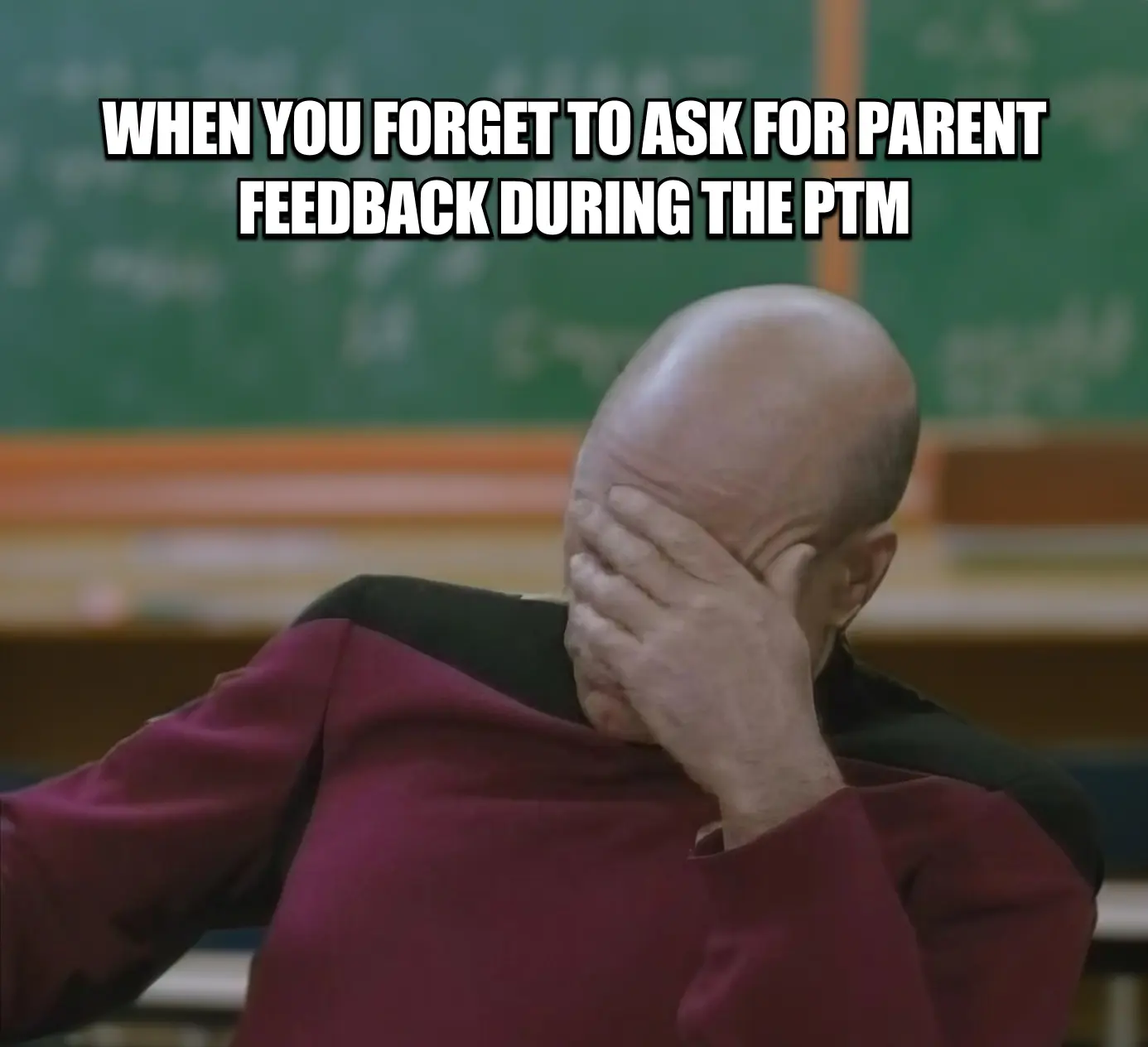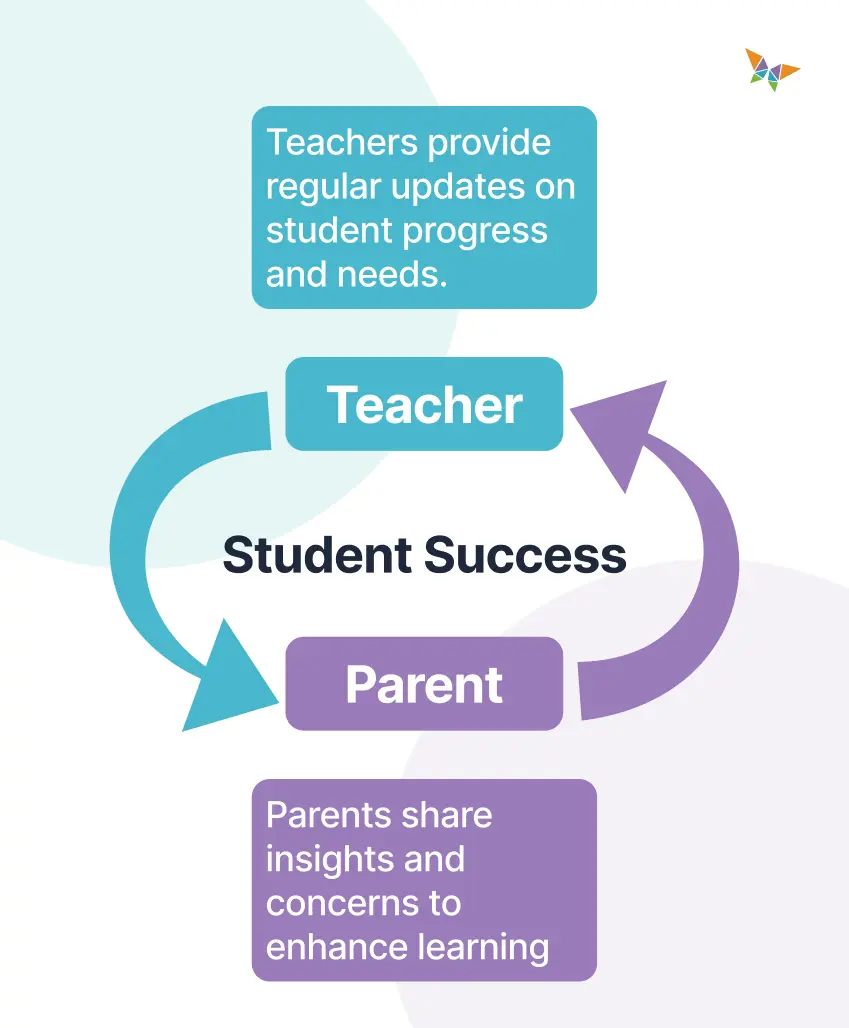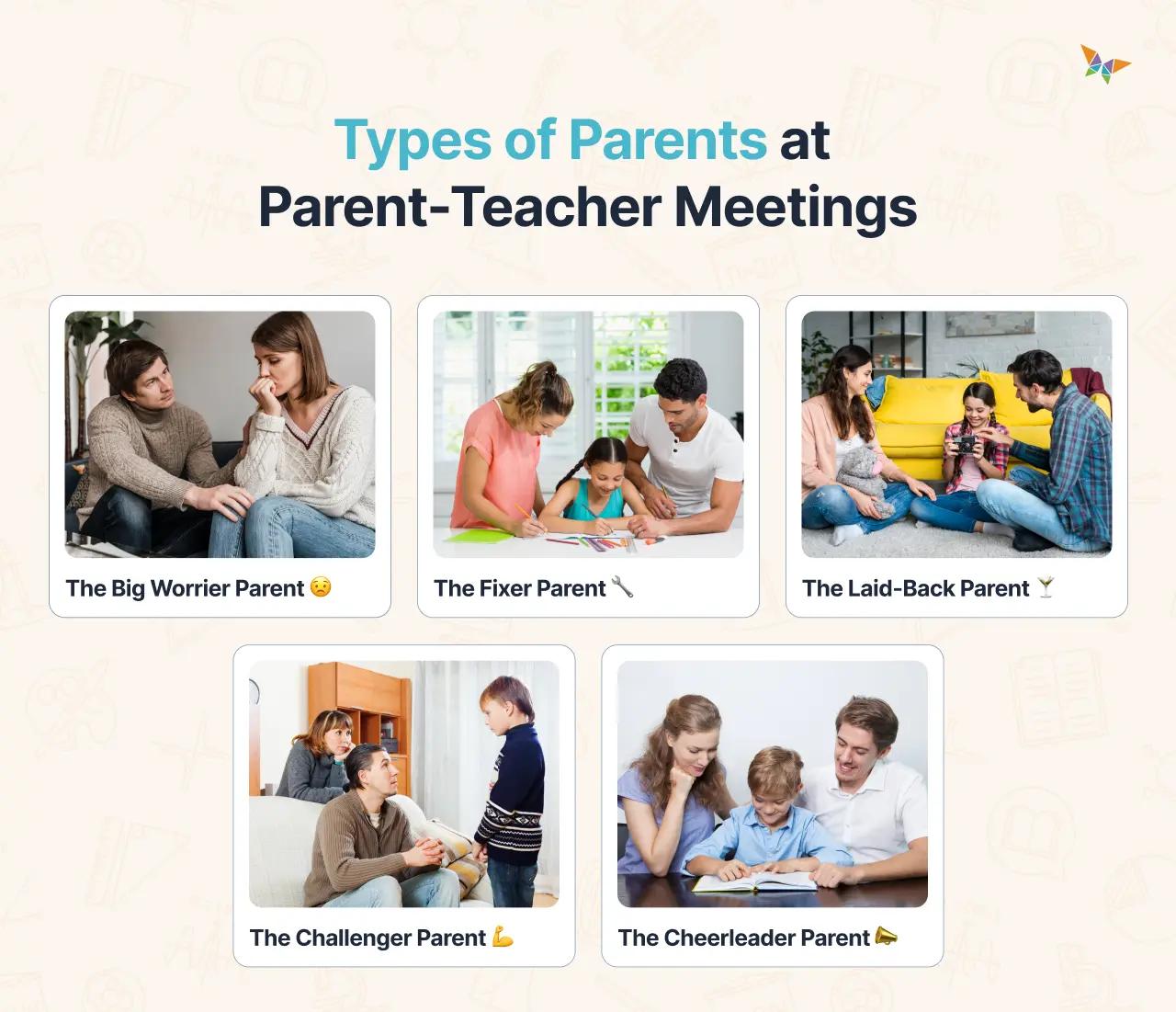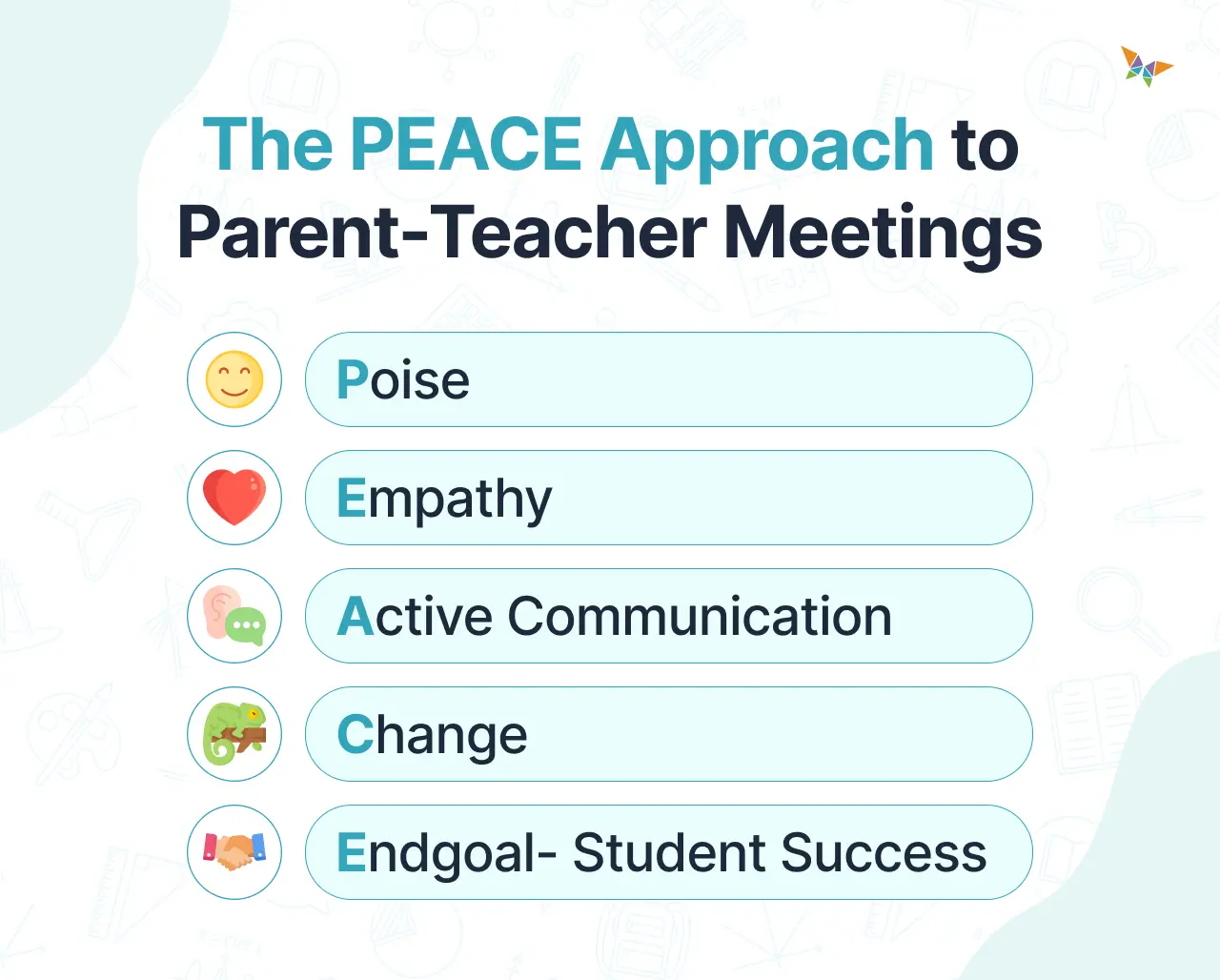Parent-teacher meetings are here.
Nervous? Excited? Overwhelmed?
Anticipating what types of parents you'll meet today – Maybe the "helicopter parent" who hovers over every detail? Or perhaps the "laid-back parent" who's cool as a cucumber.
No matter who walks through that door, one thing's for sure:
Parent-teacher meetings are a chance to truly connect with parents, share successes, address concerns, and build a support system for each student.
But let's face it, navigating those conversations can feel like walking through a maze blindfolded.
Fear not! In this guide, we'll dive into the world of PTMs and share strategies to help you tackle those tough talks with confidence. Ready to become an expert in parent-teacher meetings? Let's go!
We’ll start with exploring what is a parent-teacher meeting and unpack the typical parents teacher meeting format. Plus, we’ll discover why these meetings are so crucial.
What is a Parent-Teacher Meeting or PTM?
A PTM(full-form parent-teacher meeting) is a scheduled discussion between a student's parents and their teacher to talk about how their child is doing in school. It aims to ensure that parents are informed about their child's education and to collaborate on ways to support the student's learning.
Essentially, you can think of it as a strategic alliance meeting.
It's where
the expert on a student's school life (that's you!) and
the expert on the student's home life (that's the parent!)
come together.
It’s a powerful collaboration where both parties unite their knowledge and efforts for the student’s success.
Dr. Chandrashekar DP, CEO of Jain Group of Institutions (JGI Schools) in India, with over 20 years of experience in the education sector, emphasizes the critical role of this partnership in an Inspiring Educators podcast:
Involvement of parents is critical for the success of the educational model. So we deem parents as partners in the progress of the students. Parents are not our customers or clients, they are our partners.
During a PTM, you have the opportunity to merge insights from both school and home. This meeting is your chance to discuss what the student is excelling in and areas where they might need additional help.
It's your chance to listen, share, and plan together. Each PTM is a chance to make sure you and the parents work from the same game plan.
Let’s look at how these critical meetings can vary in style and frequency.
Parents Teacher Meeting Formats
The parent-teacher meeting format can vary depending on what works best for your school and the parents involved.
Common formats include:
- One-on-One Meetings: The most common format, allowing for personalized discussions about the student’s progress.
- Group Meetings: Sometimes, you might meet with all the parents simultaneously. This can be efficient for general updates and fostering a sense of community.
- Virtual Meetings: This format allows parents who cannot attend in person to join the conversation.
Typically, parent-teacher meetings happen at least twice a year. They can be more frequent depending on the school’s policy or specific student needs.
Now, why are these meetings so critical? Let's get into that next.
Why is Parent-Teacher Meetings Important?
Understanding why parent-teacher meetings are important can transform how you approach these interactions. Here’s why these meetings are critical:
1. Customized Support
By sharing insights and strategies, you and the parents can tailor your approaches to suit the student’s unique needs. Tailored strategies ensure that each student receives the support they need to excel.
2. Strengthening Bonds
These meetings strengthen the partnership between you and the parents, which is crucial for consistent support of the student. A strong relationship fosters a unified approach to education and student welfare.
3. Open Communication
Regular parent-teacher meetings keep all parties informed and engaged, which is essential for navigating the student’s educational journey together. Open lines of communication help ensure that everyone is aligned with the student's goals and needs.
4. Early Problem Identification
Proactive discussions during PTMs help identify and address academic or behavioral issues before they escalate. Addressing these issues early helps keep students on track toward their educational goals.
5. Feedback Loop
PTMs provide a critical feedback loop between parents and teachers, allowing both parties to express concerns and collaborate on improvement strategies. This is essential for adapting to students' evolving needs and ensuring they have the best support.
Remember, these meetings are key to making school a positive, productive place for your students. By working together, you can help every child soar.
Next, we’ll look at how you can prepare for these important meetings. Preparing well means you’ll be able to make the most of your time with each parent. Let’s set you up for success!
A parent-teacher meeting (PTM) doesn’t just start when the parents walk in; for you, it begins much earlier with the right preparation.
Here are the steps on how to prepare for a parent-teacher meeting effectively.
1. Review Student Data
Kick off your prep by digging into the students' records. Check their grades, test scores, and behavioral notes. This will help you see where they excel and where they need more support.
2. Set Objectives
What are your main goals for this PTM? Decide what you need to accomplish, whether it's discussing learning strategies, behavioral improvements, or both. Having clear objectives will guide the conversation and ensure you cover all the points to discuss in a parent-teacher meeting.
3. Organize Materials
Gather reports, student work, or other documents showcasing student performance. Having these on hand will back up your discussions with solid examples.
4. Plan Your Talking Points
Prepare a list of topics to address, including recent achievements or particular challenges. This is a crucial part of how to prepare for a parent teacher meeting because it helps you structure the meeting smoothly.
5. Prepare Solutions and Resources
Consider the questions or concerns the parents might raise and have solutions or resources ready. This proactive step can make a huge difference in the effectiveness of the meeting.
By following these strategies, you can enter each meeting confident that you are ready to engage in meaningful dialogue about the student's educational journey.
Next up, we’ll talk about what to do during the meeting to keep things productive and positive.
Successfully executing a parent-teacher meeting (PTM) requires careful planning and a thoughtful approach.
Here’s how you can effectively execute a parent-teacher meeting:
1. Welcoming Parents and Setting the Tone
A warm welcome is crucial as parents arrive for the PTM. Greet each parent warmly, using their names to personalize the greeting. This initial kindness sets a positive tone, encouraging open communication.
✨ Note: If this is your first PTM with these parents, introduce yourself properly. Explain your teaching philosophy and what they can expect from the meeting. This will help build trust and set a collaborative tone for the discussion.
2. Setting the Meeting Agenda
At the start of the PTM, briefly outline the agenda. This should include the points you plan to discuss, like academic progress, behavioral observations, and strategies for future improvements. A clear agenda helps manage time effectively and ensures that all critical topics are covered.
You can also inform parents about the agenda ahead of time through the WhatsApp group or via email. This way, they know what to expect and can come prepared with any questions or concerns.
3. Starting on a Positive Note
Always begin the discussion by focusing on the student’s strengths. Highlight their academic progress and positive behaviors first. Starting with positives not only sets a constructive tone but also balances the later discussion of more sensitive topics.
4. Ensuring Two-Way Communication
Active Listening: Show genuine interest in the parents' thoughts and feelings. Acknowledge their insights and respond thoughtfully. Show you value their input by nodding and saying things like, "I see" or, "That’s a good point." This makes parents feel respected and involved.
Cultural Sensitivity: Use inclusive language that respects cultural differences. This approach fosters a supportive atmosphere and is crucial for building trust.
For example, when discussing diverse educational needs, you might say, "How can we honor your family's experiences in our learning environment?"
Avoid Jargon: Speak in plain language and clarify any educational terms used. Making sure everyone understands the discussion prevents misunderstandings and keeps the conversation accessible. If you must use educational terms, immediately explain them.
For example, if you mention an 'IEP', follow up with, "which stands for Individualized Education Program, a plan tailored to meet unique educational needs."
Feedback and Input: Encourage PTM suggestions by parents. Ask them for their observations and what strategies they feel might support their child's learni.
Incorporating their ideas can make them feel more invested in the educational process.
5. Addressing Common Concerns and Questions
Handling concerns and conflicts effectively is crucial for a productive meeting. Here are common scenarios you might encounter and how to address them:
Incorporating these tailored responses helps you navigate through parents' PTM suggestions and address their specific concerns effectively.
With these strategies, you’re well-prepared to make every PTM impactful and constructive. Let’s now turn our attention to what comes after these meetings.
After a parent-teacher meeting, the work isn’t done. Reflecting on the discussion and following up with actionable steps are crucial for reinforcing the progress made during the meeting. The insights gathered can shape both immediate and long-term educational strategies.
1. Transitioning from Meeting to Action
Once the parent-teacher meeting wraps up, the shift from discussion to implementation begins. This phase is essential for turning conversation into effective educational strategies. These strategies impact the student’s development significantly.
2. Documenting the Meeting
It's vital to document the key points discussed during the parent-teacher meeting. This record helps you track agreed-upon actions and is a reference for any follow-up meetings.
Record Key Decisions and Action Plans: Immediately after the meeting, note down any decisions made and action plans agreed upon. This might include interventions, support strategies, or additional resources to assist the student’s learning.
3. Reflecting on the Meeting’s Effectiveness
After documenting, reflect on the meeting’s effectiveness. Ask yourself, how do you write feedback about a parent-teacher meeting? Consider these points when writing your feedback:
- Clarity of Communication: Was the student's progress and needs communicated effectively?
- Parent Engagement: How engaged were the parents? Did their insights help shape the discussion?
- Outcome Satisfaction: Were all parties satisfied with the identified solutions and strategies?
- Areas for Improvement: What could be better in future meetings? Were there misunderstandings or topics needing more clarification?
Recording this feedback helps refine your approach to future meetings.
4. Continuous Communication & Follow-Up
Keep communication open after the meeting. Regular updates on the student’s progress and responsive adjustments based on ongoing parent feedback help maintain momentum.
Follow up with parents regularly to ensure that the strategies discussed are being implemented and to adjust them as needed based on the student's evolving needs.
5. Reflecting on Your Teaching Practice
Use the meeting outcomes and feedback for professional growth. Consider how the insights gained can improve your teaching strategies.
- Implementation of Feedback: Actively incorporate parent feedback into your teaching. This might involve adjusting your lesson plans or adopting new engagement techniques. For instance, if parents suggest more visual aids, consider integrating these tools into your lessons.
- Personal Development: Reflect on your communication and engagement methods. Could these be enhanced to foster better understanding and more productive discussions in future meetings?
The post-meeting phase is as critical as the meeting itself.
This cycle of feedback and improvement strengthens the collaborative relationship between home and school, laying a strong foundation for continuous student growth and achievement.
Now, let's dive into how you can strategize for future parent-teacher meetings to maximize their effectiveness.
Crafting effective parent-teacher meetings (PTM) is about more than scheduling and agendas; it's about understanding and connecting with the diverse personalities of the parents you meet.
Now, let's delve into the various parental personalities you might encounter. Recognizing these distinct traits will allow you to tailor your approach, making each conversation meaningful and effective.
Understanding Different Parental Personalities
Every parent brings their own set of expectations and emotions to a PTM. Recognizing these traits and adjusting your approach can transform your meetings from routine discussions into impactful exchanges.
The Big Worrier Parent 😟
This parent might seem always on edge, worried about every aspect of their child's progress. They need reassurance and detailed explanations about what is being done to help their child succeed.
👉 Approach: Offer detailed feedback and specific examples of the child's progress. Prepare to spend extra time providing reassurance and explaining educational strategies in layman's terms.
The Fixer Parent 🔧
Always looking for solutions, this parent wants to know how they can help their child at home. They appreciate direct advice and practical tips.
👉 Approach: Be prepared with a list of resources or activities they can do at home. Encourage them to maintain a consistent routine that supports homework and learning.
The Laid-Back Parent 🍸
Often seeming disengaged, these parents may not ask many questions or show much concern. Your challenge is to engage them without overwhelming them.
👉 Approach: Use open-ended questions to draw them into the conversation. Highlight their child's achievements to spark interest, and suggest simple, non-demanding ways they can contribute to their child's learning.
The Challenger Parent 💪
Skeptical and often ready to debate, these parents must feel heard and respected. They may question your methods and the curriculum.
👉 Approach: Remain calm and professional, provide research-based explanations for your teaching strategies, and be open to their suggestions. This helps in building mutual respect.
The Cheerleader Parent 📣
Always positive and encouraging, they want to hear about their child's successes and how they can continue to support growth.
👉 Approach: Share positive feedback and growth opportunities. Involve them in school activities where their positivity can be contagious.
Disclaimer: While we've outlined five common parental personalities, it's important to remember that every parent is unique, and you may encounter many other types. Each PTM offers a unique interaction dynamic influenced by individual personalities and specific circumstances.
When engaging with any parent, regardless of their type, keep these key points in mind:
- Always maintain your composure, even in the face of challenging or unexpected behavior.
- Try to understand where the parent is coming from. Like you, they want the best for their child.
- Clear, open, and respectful communication is your most powerful tool. Ensure you're not only speaking clearly but also listening actively.
- Be willing to adapt your strategies. If a conversation isn't going well, you might want to change your approach or even pause the meeting if necessary.
- Remember, at the end of the day, you and the parents are on the same team—the student's team ♥️. Your shared goal is to support the student's educational journey and well-being.
After exploring the parental personalities, it's equally important to anticipate the hurdles these meetings might present. Preparing for these challenges ensures that you navigate them with ease and maintain the focus on what truly matters— student progress and parent-teacher collaboration.
Anticipating Potential Challenges and Solutions
Even with the best preparations, PTMs can encounter challenges. Here are common issues you might face and how to effectively address them:
1. Overbooked Schedules: Finding a convenient time for all parties can be tough.
💡Solution: Offer a range of times, including before or after school, and consider virtual meeting options to increase flexibility.
2. Cultural Misunderstandings: Cultural differences can lead to miscommunications.
💡Solution: Be culturally sensitive in your communication. If needed, enlist the help of a cultural mediator or translator to ensure clear understanding
3. Defensive Reactions: Parents may react defensively if they feel their child is being criticized.
💡Solution: Focus on strengths before discussing areas for improvement. Frame challenges as opportunities for growth and emphasize collaboration.
4. Unmet Expectations: Parents might have expectations that don’t align with school policies or realistic outcomes.
💡Solution: Clearly explain educational standards and their rationale. Help parents set realistic goals for their children.
5. Lack of Follow-through: Parents may agree to support strategies during the meeting but fail to implement them at home.
💡Solution: Provide clear, easy-to-follow guidelines and check in regularly via email or a school portal to offer encouragement and adjust plans as needed.
6. Resistance to Technology: Some parents might struggle with virtual meeting platforms.
💡Solution: Offer simple instructions or a quick tutorial before the meeting to ease technology fears.
7. Emotional Overload: A parent overwhelmed by concerns about their child can become emotional.
💡Solution: Keep tissues handy, allow space for emotions, and guide the conversation gently back to constructive channels.
8. Time Constraints: Limited time can make it difficult to cover all topics thoroughly.
💡Solution: Prioritize key points and offer to schedule follow-up conversations for additional discussion.
9. Misinformation: Parents may come with misconceptions or incorrect information.
💡Solution: Politely correct any inaccuracies and provide reliable sources for educational information.
10. Non-attendance: Sometimes, parents may not show up at all.
💡Solution: Reach out to understand the reason and reschedule if possible. Show flexibility and concern for their situation.
With these strategies in hand, you're ready to turn every PTM into a meaningful and constructive dialogue.
We began this guide with mixed emotions about parent-teacher meetings—nervousness, excitement, and maybe dread. Hopefully, you now feel equipped and eager to turn these meetings into opportunities for meaningful impact.
From understanding parental personalities to mastering the approach for each type—you are prepared to engage effectively with every parent you meet.
So, as you step into your next PTM, carry with you the insights and strategies we've shared. Approach each meeting with a renewed sense of purpose and the knowledge that you have the tools to make it productive and positive.
Here’s to making every parent-teacher meeting not just an interaction but a celebration of partnership and progress.






